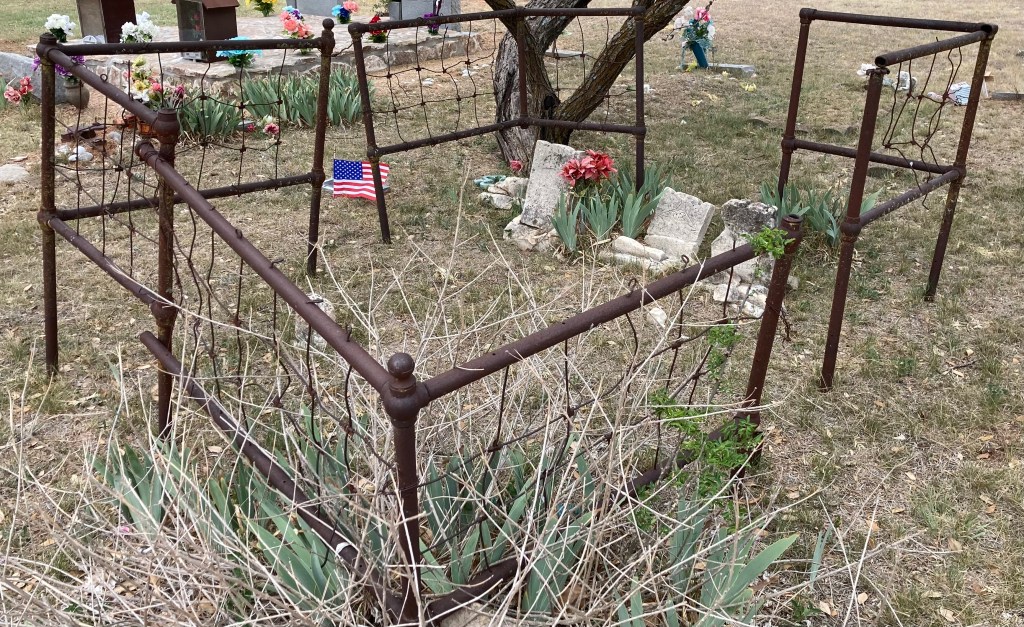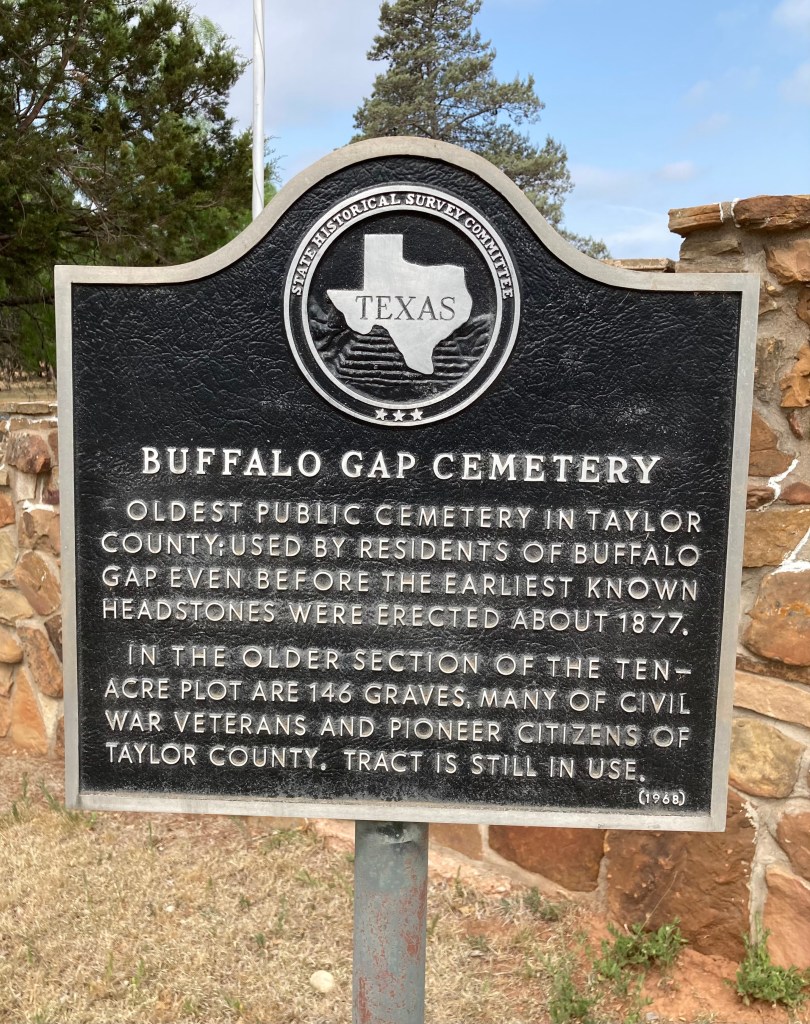
Cemeteries are sacred space, hallowed by graves and memorials. But even more, cemeteries are made holy by the presence of God who seems particularly palpable among tombs.
Some find cemeteries overly somber, even depressing. Not I. They are a comfort to me. The mood is calm, the residents quiet. Graveyards are ideal sanctuaries for meeting God.

My favorite cemetery is in Buffalo Gap, Texas, just a few miles south of where we live. The town gets its name from the odd confluence of small hills that are a northerly finger of the Texas Hill Country. They stand in a pattern that creates a gap through which roaming buffalo wandered for millennia, until buffalo hunters arrived in the 1870’s, greedily slaughtering the remarkable beasts by the millions into near extinction.
The town rose up around the gap, a place where the hills seem to create an atmosphere for a bit more rain and taller live oaks than in rest of the dry land around it. The Buffalo Gap Cemetery has graves dating back to the buffalo hunter days, with markers testifying to the hard-scrabble lives lived in that place long ago, when too many infants died, too many confederate soldiers perished, too many farmers breathed their last, too many mothers stopped rocking, too many.

When I find myself needing solitude and solace, the cemetery at The Gap offers peace. Going there recently, I wandered into the back of the graveyard, a bit farther from farm-to-market road noise, and found one of many decaying benches on which to rest. My brain quieting, my shy soul considering the possibility of wandering out, I scanned the nearby grave markers. They eschew the overly-neat style in modern urban cemeteries, where flat markers with fillable, chained bronze vases all look the same — no monuments to interrupt the horizon. Not so at Buffalo Gap, where the markers are a delightful hodgepodge of stately memorials; old stones whose old words are now washed away; assaultingly green astroturf surrounding a few black monuments, kept in line by a marble curbing; home-made memorials decorated with pinwheels, beads, and defunct solar nightlights; a couple of shrines to the Virgin; a cowboy boot and “Daddy’s Hands” formed from marble; elk antlers sitting atop one mound; a few ancient monuments with fingers that point upward; and a giant metal giraffe pretending to eat leaves off an old Mesquite. All this effort to remember, a testimony to living and dying.





Then, sitting on my bench I notice birds singing in the old cedars. How odd that we can so easily ignore these busy creatures, until their riotous music among the quiet garden of tombs brings us to our senses. How appropriate that a mourning dove sings a bit longer than the rest before taking a breath.
I spent many years attending and then teaching in theological seminaries, helping to prepare women and men for ministry. At those schools I periodically heard someone — whether an inmate or a visitor — joke about the place actually being a “theological cemetery.” Chuckle about dry lectures and dusty words — good one. But in truth, cemeteries are at least as theological as seminaries, for those willing to listen to the silent lessons. A cemetery is a theological witness.
A witness to death, whispering that we are mortal: all of us will die, too — each heartbeat taking us closer to being no more. This fact should not depress us, but rather bring us to reality, a sobering truth as old as creation. The Almighty has made all of us to live and one day die; that’s been the plan from the beginning, no matter how many hours we spend ignoring it. The unstoppable journey will end in some sort of cemetery. While the reality may alarm us now, when the time comes, it will be as simple as letting go, like being born again.
A cemetery is a witness to community — to a town that offers a field to receive our bodies, but even more witness to family who love and remember and mourn. At death our souls go to God, but part of our souls live on in the family that continues. And those families mark our graves in ways that honor us, noting that we lived and died, that we mattered, made a difference. The thoughtful caretakers of the Buffalo Gap Cemetery have even left behind small marble markers that declare “UNKNOWN” at graves where the names have not endured, anonymous markers noting the dead and remembering families who remembered.



A cemetery is a witness to creativity. A place like the memorial garden at Buffalo Gap is an outdoor museum of art — creations in durable stone, marble, metal, wood, and more transient beauty in ribbons, trinkets, and flowers. Conventional gravestones offer visitors a sense of stability. The fanciful ones testify to the wonderful messiness of vitality. They all witness to loved ones, ordinary yet unique.

A cemetery is a witness to life. Each plot, whether fresh mound, ancient vault, or crusted red dirt, speaks of a life given to the earth by God, lived for days or decades, then surrendered back to the earth, only to live on in some mysterious, imperishable form beyond this world. Why have cemeteries? They are actually places not for the dead but for the living: sacred ground for reminiscing, for being still, for knowing one’s own soul, for breathing in the breath of God. And they are places that send us out, back into the rest of the earth, to live fully, a bit more aware of how precious our lives are.
I love this beautiful piece! Thank you, Bob. Charles and I now live in Lubbock. David and families live here. It is wonderful being able to be together again. David writes “Snapshots” 4 days a week which he uses to help his readers to gain deeper meaning from the next Sunday SS lesson’s scripture and help us to apply it to our lives. If you would like to read one or all, you can get on his mailing list. dakeldean@gmail.com. He, too, has a God-given gift for writing. Charles and I miss seeing our many special friends, but love being here where God has planted us. If you two are ever up this way, we’d love to see you. Karin Richardson
Sent from my iPhone
>
LikeLike
Thanks, Karen, for reading and the kind words. Glad you’re doing well in Lubbock and enjoying the gift of family. Give my best to all.
LikeLike
Awesome work Dr. Ellis. So often, while doing funerals at graveside, the serenity gives me comfort, but I know that is what God wants for me most of all at this point is peace. God bless you Brother!
Sincerely In Christ, Pastor/Chaplain Robert R. Coon Sr. 239-634-3320 rcoon1011@gmail.com
LikeLike
Well said. Thanks.
LikeLike
Bob, your writings are like springs in the dessert to me. It is so beautiful here with mountains all around us. We love being so close to Allison and Mike and spending time with them. But we miss you and all of our dear friends, our church, neighbors, doctor in Abilene
We have a couple next door who are people of faith. We have not yet found the church where God wants us to serve. Please pray with us about that. We knew it would not be FBC Abilene, but it is a whole different world.
Always looking forward to reading your next words.
We are enjoying S.S and church from Abilene.
LikeLike
Thanks, Clara, for the kind words and update. God’s grace to you in the new adventure.
LikeLike
Wonderful article on Buffalo Gap Cemetery. Thank you so much.
LikeLike
Thank you for your work to keep it a beautiful, sacred place.
LikeLike